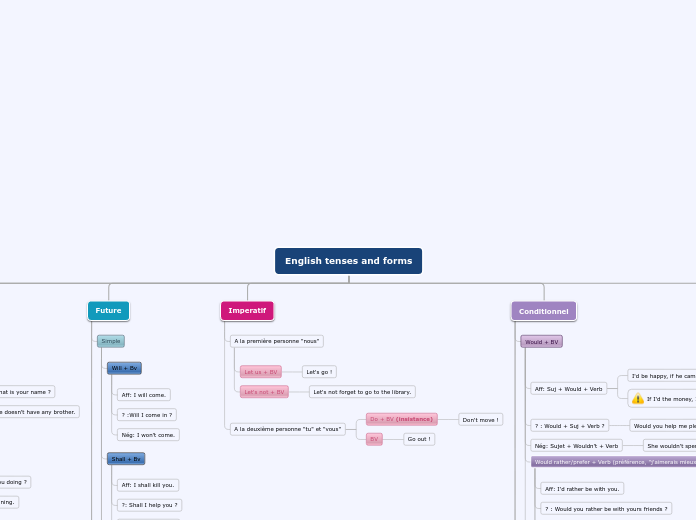English tenses and forms
Past
Present Perfect (influence sur le présent)
Have/Has + part. passé
Aff: Suj + have/has + part. passé
They have worked in the USA.
? : Have/has + Suj + Part. passé
Have they been there ?
Nég: Suj + have/has + not + part.passé
They haven't been there.
Have/Has been + V-ing
Aff: I have been working since 1999.
? : Have they been living here ?
Nég : I haven't been living here.
Preterit (rupture précise avec le présent)
Simple
Aff: I lived in London.
?: Wh-/ Did I live in london ?
Nég: I didn't live in London.
Was/Were + ing
Aff:I was playing ( when you phoned).
Action de 2° plan (imparfait en Fr.)
?: Was I playing ?
Nég:I wasn't playing.
Past Perfect / Pluperfect (action du passé antérieure à une autre aussi du passé)
Had + part. passé
Aff: He had worked.
?:Had he worked ?
Nég: He had not worked.
Had been + infinitif ing
Aff: I had been watching.
?: Had I been watching ? (How long)
Nég: I had not been watching.
Used to ("jadis...)
Aff: I used to work in France (now I work...).
?: Did you use to live in Dublin ?
Nég: He didn't use to smoke (now he smoke).
Present
Simple (every day, truth...)
Aff: Suj + Verb
I have a car.
? : (Wh +) Do/Does/Be + Suj + Verb ?
What is your name ?
Nég:- Suj + Do/Does/Be + not + Verb
She doesn't have any brother.
Continuous: BE + ing (now)
Aff: Suj + Be + V-ing
I'm working.
?: (Wh +) Be + Suj + V-ing ?
What are you doing ?
Nég: Suj + Be + not + V-ing
She isn't running.
Future
Simple
Will + Bv
Aff: I will come.
? :Will I come in ?
Nég: I won't come.
Shall + Bv
Aff: I shall kill you.
?: Shall I help you ?
Nég: I shan't work.
Be going to + Bv
Aff: It's going to rain.
?:
Nég:
Be (present) + ing
Aff: I'm seeing Jake tonight.
?:
Nég:
Future Perfect
Aff: He will have finished.
?: Will he have finished ?
Nég: He will not have finished.
Future progressive
Aff: I will be playing baseball.
?: Will be playing baseball ?
Nég: I won't be playing baseball.
Future perfect continuous
Aff: We will have been starting.
?: Will we have been starting ?
Nég: We won't have been starting.
Imperatif
A la première personne "nous"
Let us + BV
Let's go !
Let's not + BV
Let's not forget to go to the library.
A la deuxième personne "tu" et "vous"
Do + BV (insistance)
Don't move !
BV
Go out !
Conditionnel
Would + BV
Aff: Suj + Would + Verb
I'd be happy, if he came (condition)
If I'd the money, I'd buy a car ( If I had..., I would...)
? : Would + Suj + Verb ?
Would you help me please ? (volonté/demande polie)
Nég: Sujet + Wouldn't + Verb
She wouldn't spend her holidays pictures (habitude passée)
Would rather/prefer + Verb (préférence, "j'aimerais mieux")
Aff: I'd rather be with you.
? : Would you rather be with yours friends ?
Nég: I'd rather not go.
Pour compléter la comparaison, on emploie "than" et surtout pas "that": We would rather resign than work with you.(démissionner)
Had better + Verb ("je ferais mieux de")
Aff: Suj + had better + Bv
You'd better go home.
? : Had + Suj + better + Bv ?
Had I better stay or go home ?
Nég: Suj + had better + not + Bv
You had better not tell them.
Should + BV ("devrais/devrait...")
Aff : Suj + Should + Bv
You should talk to him.
? : Should + Suj + Bv ?
Should I bring my bag ?
Nég : Suj + shouldn't + Bv
We shouldn't close the windows.
Could + BV ("pourrais/pourrait...")
Aff : Suj + could + Bv
You could clean your bedroom.
? : Could + Suj + Bv ?
Could you answer me ?
Nég : Suj + couldn't + Bv
I couldn't do a dessert.
Would have + part. passé
Conditionnel passé
Aff : Suj + would have + Part.passé
If I had known, I would have told my parents ( Si j'avais su, je l'aurais dit à mes parents)
? : Would have + Suj + Part.passé ?
Sujet secondaire
Nég: Suj + would have + not + Part.passé
Sujet secondaire
Passif
Be + part.passé
Be est la marque du temps, seul lui changera
Present: It is located
Past: It has been seen
Future: It will be created
Be + being + part.passé
Present: Their are being destroyed
Past: We were being fined
